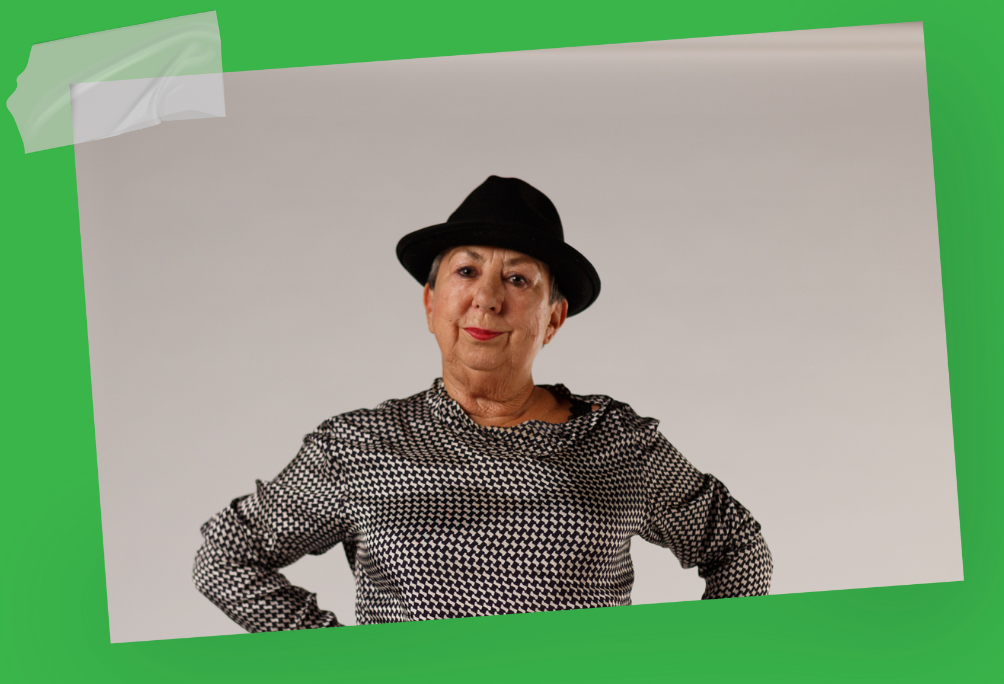Jack McGee
The show takes place in the Studio, and the set is very lowkey. A costume rack, a black sheet backdrop, a chair. There’s no frills here, nor need for them. Lighting is straightforward, but the rare uses of colour helps connect certain events together subtextually in a way that makes the show feel more cohesive, and is quite effective.
This history of theatre element is a real joy for me as a theatre fan. These gossipy, no prisoners taken (though apparently one name was changed), stories about the history of theatre in Aotearoa and beyond, are fascinating. In an era where we’re currently scrambling to figure out how to put money towards theatre and theatre education seeing all the different ways Kelland had to adapt and change, to chase the opportunity to act professionally feels very relevant. It’s no surprise to me that the project started life as a set of five short stories, you could see the show being expanded into full memoir-in-book-form, at the expense of losing Kelland’s endless charm.
That being said, the show is far from a breezy ride through the world's stages. Kelland does not mince words, and shows us some of the more harrowing periods of her life in unflinching honesty. Supposedly, this is largely influenced by her dramaturg Deb Filler, who pushed Kelland to dig her feet in, instead of giving us a once over lightly. The result is a fascinating picture of how power structures in theatre and the world at large, and of course, a lot of the men who controlled them. The show is reasonably understated about this, showing people as reasonably full human beings, but the picture it paints is pretty scathing.
For all the scumminess along the way however, there’s plenty of moments of real kindness. In many ways, the show could be read as a special thanks list for Kelland's life at large. There are countless figures who pop in to support Kelland. There are people who exist in shades of grey as well, falling somewhere in between. As the story takes place over a long period of time, there’s a lot of room for people, and Kelland herself, to change within it. Which is exciting, and somewhat inspiring. There’s something reassuring about seeing life in macro, and how people can be there for each other.
There’s also some real introspection into Kelland’s relationship with substances, and her own accountability over various difficulties in her life. She is compassionate to herself, but she doesn’t sugar coat situations, and the word liability begins to rhyme with itself over the course of the hour. Honesty doesn’t necessarily equal great theatre, and the need to make things as confessional as possible often gets in the way of making a great show. But Kelland deploys her personal, tougher, truths for real effect here. It never feels like she’s using us for therapy, more like she’s already done the work and has no time to mince words.
Tart on Tour doesn’t need to be anything more than it is, as it’s already a great hour, but I do think it could be more. There’s some very minimal projection in the show, and while I appreciate the urge to steer away from making it feel like a powerpoint, I would’ve loved to see more images of Kelland throughout the years, and some of these different things she describes. There’s also sections of the show that blur together. For the most part, Kelland manages to walk the tightrope of keeping all of these different stories feeling distinct, and compelling, but there’s a few bits that slip through the gaps, and I wonder if there’s room to edit them down, or find some more creative ways to communicate them.
Part of the reason for that, is that the story ends midway through Kelland’s life. After doing some googling, I find she had a whole new career as a casting director for Shortland Street since then. Which I want to know all about! Tart on Tour feels in many ways like the first act of a two act play. I applaud its focus, and it ends in a very logical and emotionally fulfilling place, but I still want more! I think this is testament to how well Kelland tells her story.
Tart on Tour feels like it should be a shoo-in for a Circa Two season, and I hope it gets one. It’s a charming and watchable hour that doesn’t feel like junk food. Expertly performed, with real heart, I feel really lucky to have got to hear some of Kelland’s stories and I hope I get to hear many more.






